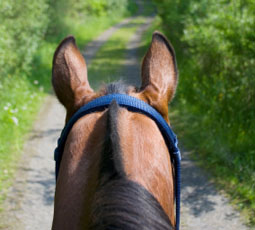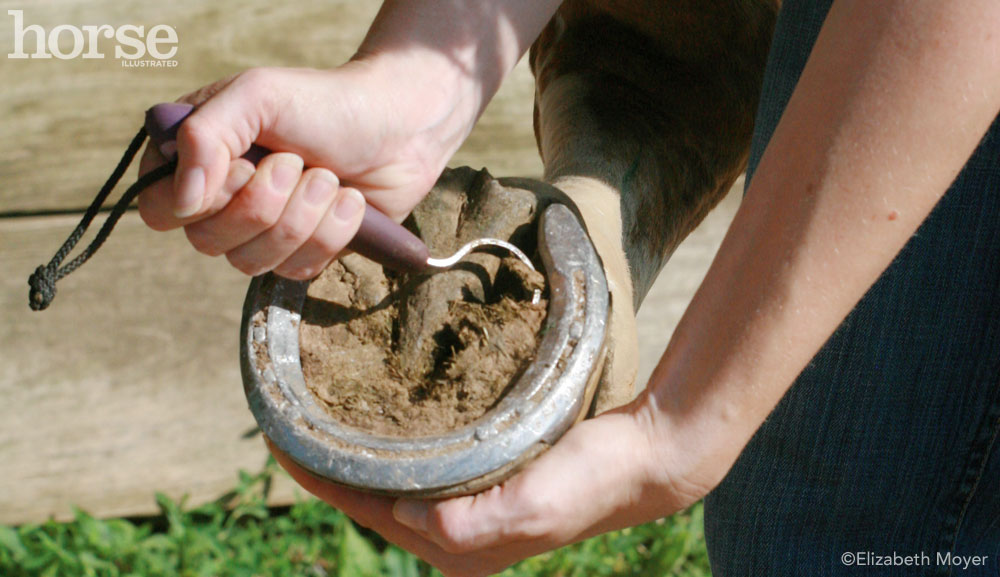In our Ask the Vet column, Dr. Lydia Gray answers your horse-health questions at horseillustrated.com/AskTheVet. Got a question for Dr. Gray? Send it to hc-editor@luminamedia.com and use subject line “Ask the Vet.”
Q: Have you ever heard of dewormer causing or aggravating ulcers? We have a Percheron that came from Canada originally that we believe has ulcers. We’re told she was dewormed just before she left. I know stress is a major factor with ulcers, and the 24-hour trailer ride from Canada was likely stressful, but I just want to make sure deworming wouldn’t be a problem before we start her on a parasite control program.

A: Congratulations on your new horse! As you suspect, trailering—especially 24 hours worth—is a MUCH bigger stressor on the mind and body of a horse than simply administering a dewormer. That’s because there are so many disruptions associated with travel that we, as humans, might not even think about. An excellent resource for trips of any length but especially long ones is Guidelines for Horse Transport by Road & Air, edited by Catherine W. Kohn. This text basically divides horse transport into short, medium, and long trips:
“Journeys of 3 hours or less are unlikely to be associated with transport related diseases, physiologic derangements such as dehydration, or fatigue due to energy expenditure and reduced feed intake. It is unnecessary to plan rest or observation stops for such journeys.”
However, advice for longer trips is to stop, offer water, and observe every 4 hours. In addition, this text recommends that ground transport time per day should not exceed approximately 12 hours from the time the first horse is loaded on the vehicle. Eight hours of rest should be provided after every 12 hour travel segment. It also suggests that horses who have undergone more than 12 hours of travel should be given at least 2 to 3 days to recover.
The book goes on to discuss effects of transport on the GI system (reduced feed intake, altered eating patterns, depressed gut motility), weight loss and dehydration, shipping fever, and other health issues. In one study of ponies transported by road, the energy expenditure during travel was similar to the energy expenditure of walking for the same duration of time!
“Road transport is a complex operation involving multiple potentially stressful components. These include separation from a familiar environment, isolation, confinement, vibration, jolting, accelerations and decelerations, loss of balance, noise, fluctuations of temperature and humidity, altered and possibly inadequate ventilation, exposure to gases and particles from exhaust, urine and feces, deprivation of food and water, orientation in relation to the direction of travel in the horse box, length of journey, method of transport, skill of the driver, and head posture.”
The point is, transport is rough on horses, and long trips (greater than 12 hours), are especially taxing. So between leaving her herd mates and probably the farm she grew up on, eating and drinking on a much different schedule, and dealing with being confined in a scary moving space, it’s no wonder the protective factors in her stomach were overwhelmed by the aggressive factors, leading to gastric ulcers.
Is there a link between deworming and gastric ulcers? Possibly, but it seems highly unlikely in this situation with so many other proven risk factors for gastric ulcers at work.
Not to fear! Now that your mare is at her new home, you can have her thoroughly checked out by your veterinarian. He or she will be able to tell you if indeed your mare is suffering from gastric ulcers and how best to treat them. While your vet is there would be a great time to discuss your parasite control program, both for this mare as well as for the rest of the horses on your property. Being new to the farm you’ll probably want to start collecting fecal egg counts on her right away, so that you figure out her parasite egg shedding status (low, medium, high) and schedule her next deworming appropriately. Best of luck with your new horse!
Liked this article? Here’s more from Dr. Gray:
The Colic/Ulcer Connection
Parasite Control at Boarding Stables





